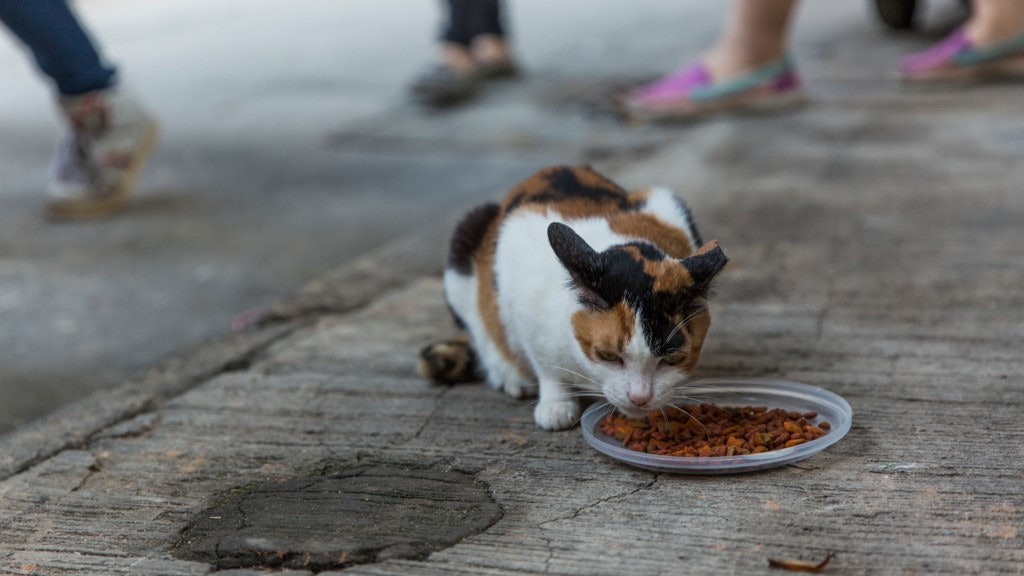The AFCD's latest submission to the Legislative Council proposes amendments to cover the current no-feeding zone for wild animals throughout Hong Kong and significantly increase the penalty. one year.
The no-feeding area has been greatly expanded, but the definition of wild animals is broad. Will feeding stray animals and birds violate the law in the future?
Some lawyers said that in the relevant regulations, wild animals are defined as any animals other than "domestic animals" such as cats and dogs, and domestic animals that are lost or abandoned are not wild animals.
However, wild pigeons and wild birds are obviously wild animals. After the amendment, it is illegal for the public to feed wild pigeons.
The AFCD also explained that, according to the proposed amendments, as long as the animals involved are "domesticated animals", no matter whether they are stray or unattended for a long time, they will not be regarded as wild animals.
This means that feeding stray cats and dogs in the future will not necessarily violate the ordinance on the prohibition of feeding wild animals, but it is necessary to pay attention to whether it will cause environmental cleanliness and hygiene problems.
▼The Agriculture, Fisheries and Conservation Department first dispatched 7 wild boars on Shenwan Road to humane destruction after being anesthetized▼
+1
The current no-feeding zone includes Jinshan, Lion Rock and Shing Mun Country Park. The authorities explained that the delimitation of the no-feeding zone is mainly for the feeding of wild monkeys.
The Agriculture, Fisheries and Conservation Department stated that wild boar feeding activities are the main cause of wild boar nuisance in recent years. Therefore, it is recommended to extend the no-feeding area to the whole territory, and to concentrate resources on the most serious wild boar nuisance areas and nearby areas to carry out law enforcement work.
Many citizens may worry that once the new law is passed, will it mean that feeding "Langlang (stray animals)" will also fall into the legal open in the future?
According to the Wildlife Protection Regulations, wild animals are defined as "any animals other than domesticated animals".
In its reply to the Audit Commission in 2019, the AFCD explained that domesticated animals refer to animals kept as pets or food, including cats, dogs, cows, chinchillas, hamsters, pigeons and rabbits.
The AFCD also explained that no matter how long an animal strays, as long as it falls into the above categories, it will not be regarded as a wild animal.
However, the AFCD also mentioned in its submission to the Legislative Council that the feeding of wild animals outside the no-feeding zone is generally regarded as a problem of environmental cleanliness and hygiene.
According to the Fixed Penalty (Cleanliness and Obstruction of Public Places) Ordinance, the relevant fixed penalty amount is $1,500.
The places where the feeding of wild animals is currently prohibited are Kam Shan, Lion Rock and Shing Mun Country Parks, parts of Tai Mo Shan Country Park, Tai Po Kau Nature Reserve, Caldecott Road area adjacent to Tai Po Road, and Pipa Hills section of Tai Po Road .
(Screenshot of "Audit Report")
Barrister: Wild definition is broad or controversial
Kim J McCoy, a barrister and founder of animal protection organization HKALPO, said that due to the wide definition of wild animals in the law, it is controversial whether feeding will be illegal in the future, but he believes that feeding wild pigeons "Definitely".
Mai Jianqi believes that it is a good thing for the authorities to expand the no-feeding area for wild animals, because it can protect wild animals: "If you don't feed them, the chances of animals falling into urban areas are very low." Wild boars, and wild boars will go to urban areas to forage in garbage bins in addition to being fed.
Therefore, he suggested that the authorities should improve the design of the trash cans as soon as possible so that wild animals such as wild boars would no longer feed in the trash cans.
+4
Animal protection groups fight for a long time: absolutely
Mak Chi-ho, executive chairman of the non-profit veterinary service association, said that he has been urging the AFCD to extend the no-feeding zone to the whole of Hong Kong, thinking that the current proposal is "absolutely wrong".
He emphasized that in terms of protecting wild animals, all wild animals should not be fed: "I hope all Hong Kong citizens understand that Hong Kong is really subdivided into the suburbs, so when coexisting with wild animals, you should have a mentality that you can't cross the border. boundaries, including feeding practices."
When asked if the public will easily fall into the legal net by mistake?
Mak Chi-ho believes that the government and organizations have advocated and educated the public not to feed wild animals for many years, and the public should be aware of the inappropriate behavior: "It would be a good thing if the ordinance is actually violated. Hello area) I have been talking about it for many years, and it has been feeding the horses every day.”
He also emphasized that citizens should never feed wild animals: "Animals have their own ecology and ways of elimination, and humans should not interfere with their survival mechanism."
Mak Chi-ho, executive chairman of the NPV Non-Profit Veterinary Services Association.
(file picture)
Wild boars|The Hong Kong government plans to amend the regulations to expand the no-feeding zone for wild animals. Violators will be fined up to 100,000 in prison for one year 2 wild boars caught on Mount Parker Road Since November last year, 76 wild boars have been caught for humane destruction. The government has revised the law to revise the penalty for owners who refuse to hand over infected animals. Internal amendments to expand the ban on feeding areas and increase the penalty. The Agriculture, Fisheries and Conservation Department humanely destroyed 28 wild boars within two months. Director Liang Zhaohui: will continue to capture the strategy






